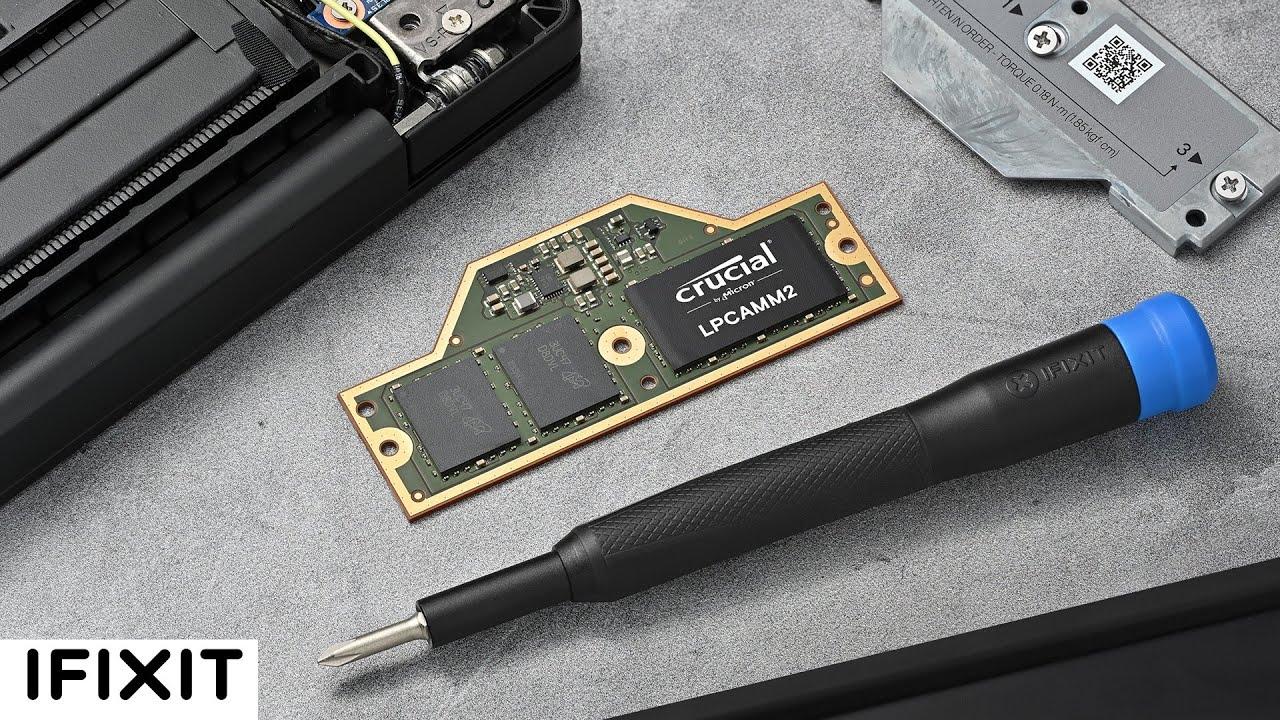Since I almost entirely use a desktop or Steam Deck, I don't follow the laptop world too closely but the new upgradeable LPCAMM2 RAM for laptops sounds really awesome.
Laptop RAM has been a problem for quite a long time, and while there's various laptops out there that do have somewhat easily upgradable RAM there's plenty that don't. One of the major reasons being power-draw in tech like SODIMM (which is pretty old now), which is why plenty of vendors opt for LPDDR instead but that's generally soldered down tight by the CPU. So this is where the new LPCAMM2 comes in. It's low-power but soldered onto a special PCB that you can easily slot in and out of a laptop. Heck, could be great for handhelds too, some definite potential there.
Micron are the first to supply it, with Lenovo getting in early adopting it for their new ThinkPad P1 Gen 7.
“LPCAMM2 is a game-changer for mobile workstation users who want to enjoy the benefits of the latest mobile high performance memory technology without sacrificing superior performance, upgradeability, power efficiency or space,” said Jonathan Weech, senior director of product marketing for Micron’s Commercial Products Group. “With LPCAMM2, we are delivering a future-proof memory solution, enabling faster speeds and longer battery life to support demanding creative and AI workloads.”
The team at iFixit are really excited about it, since it makes laptops again more upgradable and repairable and going by their video below it looks ridiculously easy to do.

Direct Link
Easy to replace, fast and low power draw? Sold. Hopefully we will begin to see wider vendor adoption on this!
There's a fun bit of history behind this tech you can read about in the iFixit blog post too. As we owe Dell a firm handshake on this one for the initial iteration (CAMM), which they decided not to keep for themselves to help make it an actual standard.
For so far as I understand it requires only a motherboard change and not a cpu change.
Laptop RAM has been a problem for quite a long time, and while there's various laptops out there that do have somewhat easily upgradable RAM there's plenty that don't. One of the major reasons being power-draw in tech like SODIMM (which is pretty old now)
Another one being product segmentation. Guess what I suspect will turn out to be the bigger consideration for major manufacturers.
This is the holy grail of RAM.
Even if this is just FRP and not actual open source. They could have extorted money out of us all like a bunch of suckers. Standardization helps, but is it really worth it?
Last edited by LoudTechie on 13 May 2024 at 1:01 pm UTC
Laptop RAM has been a problem for quite a long time, and while there's various laptops out there that do have somewhat easily upgradable RAM there's plenty that don't. One of the major reasons being power-draw in tech like SODIMM (which is pretty old now)
Another one being product segmentation. Guess what I suspect will turn out to be the bigger consideration for major manufacturers.
Laptop RAM has been a problem for quite a long time, and while there's various laptops out there that do have somewhat easily upgradable RAM there's plenty that don't. One of the major reasons being power-draw in tech like SODIMM (which is pretty old now)
Another one being product segmentation. Guess what I suspect will turn out to be the bigger consideration for major manufacturers.
For full set manufacturers yes, but lots of manufacturers don't have the budget, market power and talent to do that without getting behind.
There is an entire PC prebuild industry build up out of such manufacturers and most phone manufacturers use externally produced parts too.
Apple gets away with it, but Apple is a. bigger than the rest, b. desperate and c. not in the pc space.
Laptop RAM has been a problem for quite a long time, and while there's various laptops out there that do have somewhat easily upgradable RAM there's plenty that don't. One of the major reasons being power-draw in tech like SODIMM (which is pretty old now)
Another one being product segmentation. Guess what I suspect will turn out to be the bigger consideration for major manufacturers.
Product segmentation is less of a factor than you think.
Manufacturers have to balance the reduction in the BOM (Bill Of Materials) from integrating all the components against the increase in SKUs (Stock Keeping Units). Most of the time, it's only the biggest manufacturers for whom the math comes out in favour of more SKUs. That's why Apple can afford to soldier all the RAM - they sell enough that the saving from using slightly less materials outweighs the saving from from making more computers. If you look at smaller manufacturers, their math makes it more favourable to have adjustable RAM
It's cool that this type of technology exist but it just feels like manufacturers will continue to use the model of soldered on RAM because they can charge more for it.In what sense? I imagine there are rather few laptop buyers who are going to look at two otherwise identical laptops and buy the one with the higher price tag because its memory is soldered in.
This is a type of memory module developed by Dell. Its use requires the payment of royalties, therefore an increase in costs. Other royalty-free and equally efficient technical solutions also exist...To qualify for standardization they've to at least require "reasonable and fair" compensation for the right to use it. That puts a big limit on the price and this solution is a lot more efficient than you might think.
It's what allows the M1 and the M2 as low power ARM processors to approach the raw performance of the top of the line high power x86 processors.
RAM is a common bottleneck on modern devices.
This tech allows for quadrupling RAM capacity compared to normal laptops and a significant speed boost and it's backwards compatible with at least DDR4 and DDR5.






 How to set, change and reset your SteamOS / Steam Deck desktop sudo password
How to set, change and reset your SteamOS / Steam Deck desktop sudo password How to set up Decky Loader on Steam Deck / SteamOS for easy plugins
How to set up Decky Loader on Steam Deck / SteamOS for easy plugins
See more from me